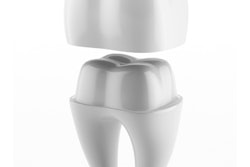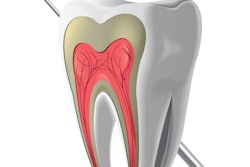
Composite material is suitable for repairing and replacing cuspal defects, according to research published December 20 in the Journal of the American Dental Association.
A team led by Dr. Catherine Hopkins from the 1st Dental Battalion said their results are especially relevant for cases of one-cusp fracture and one-cusp fracture involving the adjacent proximal box. Hopkins was a graduate student at the University of Iowa when the study was ongoing.
For the study, the researchers placed amalgam restorations in 84 permanently extracted molars and randomly assigned them to 14 groups. They found significant differences among groups for nonrestorable fractures and fracture resistance.
Based on their results, the study authors suggested that repairing cusp fractures in existing mesial-occlusal-distal (MOD) amalgam-restored molars is a good treatment option. However, they also noted that resin-based composite will withstand higher forces.



















